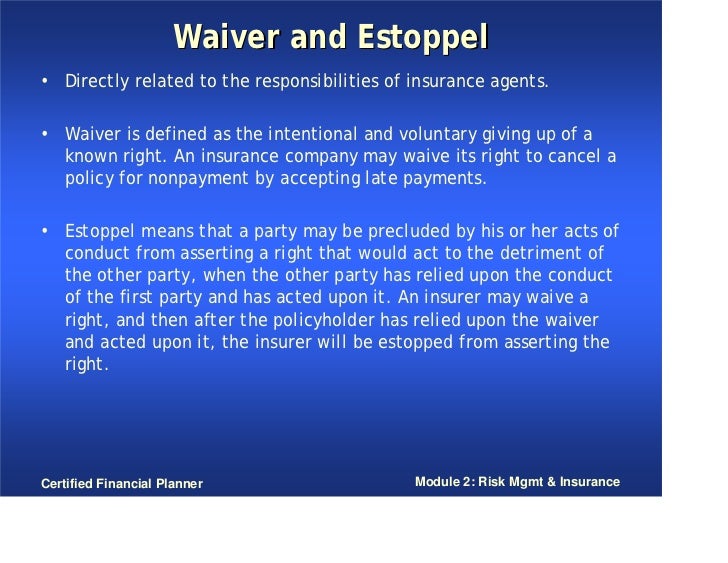Equitable estoppel is distinct from promissory estoppel. Promissory estoppel involves a clear and definite promise, while equitable estoppel involves only representations and inducements. The representations at issue in promissory estoppel go to future intent, while equitable estoppel involves statement of past or present fact. In equitable estoppel the party claiming estoppel is basing its defense on assertions of present or past facts.

The rationale behind estoppel is to prevent injustice owing to inconsistency or Fraud. There are two general types of estoppel : equitable and legal. Can a person sue for promissory estoppel? What is equitable estoppel mean?
Essentially, equitable estoppel is a method of preventing someone from going back on his word in a court of law. For example, equitable estoppel would be granted to a defendant if the plaintiff previously gave his permission for the defendant to do something, and then sued the defendant once he did. To explore this concept, consider the following equitable estoppel definition. See full list on legaldictionary. Estoppel is a term that is notoriously difficult to define in legal terminology.

In its simplest form, estoppel translates to mean stopped in French, as in someone is being stopped from doing or saying something. Because the term is so vague, it has been attached to numerous areas of law. The purpose of estoppel is to hopefully prevent the wasting of court resources by stopping people from abusing the legal system by filing frivolous lawsuits. However, estoppel can also be considered controversial. Because estoppel is a broad term that can be defined in many ways, these are arguably the three most important types of estoppel to consider.
Jessica takes her car to the mechanic to have some work done. During the process, the mechanic accidentally slips with one of his tools and puts a small dent in Jessicas car. He brings Jessicas attention to the dent and offers to fix it, but she says that its only cosmetic and not to worry about it. In a case concerning promissory estoppel , one person cannot promise the other party to a contract that part or all of the contract will not be enforce only to later try to enforce that provision anyway.
For instance, if an employer tells an employee that mandatory overtime will not be enforce despite being part of the employees contract, the employer cannot then attempt to enforce it later. The employee is not then obligated to abide by that part of the contract, and promissory estoppel would be granted in his favor. It is important to note the distinctions between collateral estoppel and appeals. Collateral estoppel does not prevent someone from filing an appeal to have a different court reconsider the issues at hand. Instea collateral estoppel stops someone from bringing a frivolous lawsuit by trying to get in through the back door what he couldnt get in through the front.
Betsy transfers the title of a plot of land to her daughter by deed. Betsy acquires the title to the property after the transfer. An example of equitable estoppel can be found in the case of Aspex Eyewear Inc.

Clariti violated Aspexs patents by selling AirMag, a particular brand of eyeglass frames. Once Aspex became aware of this product, Aspex sent Clariti two letters (one for each patent) asking that they cease and desist selling the product immediately. On appeal, the Court found that Aspex was misleading when convincing Clariti that Aspex did not intend to enforce the 7patent against Clariti. Further, the Court found that Clariti relied on Aspexs misleading conduct to expand its business, doing so after not hearing anything else from Aspex after the initial incident. In other words, Aspex should have followed up after receiving Claritis response letter.
Clariti responded to the letters, noting that they had never intended to infringe upon Aspexs patents. Clariti requested information from Aspex to review and responded back to Aspex that it did not believe Claritis products infringed upon Aspexs patents. After this incident, Clariti did not hear anything from Aspex for over three years. At this point, Aspex sent Clariti another letter claiming that the AirMag product infringed upon one of the patents referred to three years prior.
Clariti refused to stop selling the AirMag bran and so Aspex filed a civil lawsuit. The district court dismissed one of the infringement claims, but left the other one active the 7patent. Clariti then moved to dismiss the remaining infringement suit, arguing that Aspex was barred by equitable estoppel , due to their remaining silent for three years on the subject.
This is where equitable estoppel came in. The evidence in the record suggested that, had Aspex filed suit against Clariti like they had originally threatene then in all likelihood Clariti would have discontinued their AirMag line and went on to other business ventures. This was enough proof for the Court that Clariti relied on Aspexs silence as permission to go forwar and that Aspex did not have a leg to stand on in that regard. This phenomenon is usually attributed to increased global competition.
Lor Williston on Contracts § 8. A defining case of equitable estoppel comes from Crabb v. This principle is commonly invoked in common law in case of breach of contract or against a Government. The promissory estoppel doctrine allows an injured party to recover on a promise upon which he relie and then suffered a loss as a result. Example of promissory estoppel : Charles is ten years from retirement age, and has worked for the company for years.

No comments:
Post a Comment
Note: Only a member of this blog may post a comment.